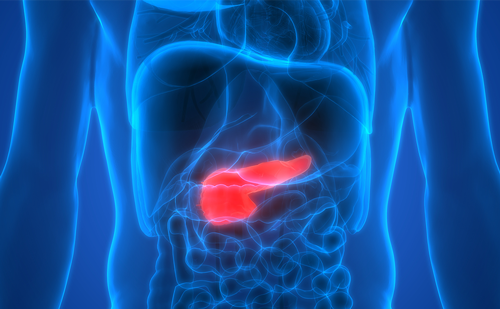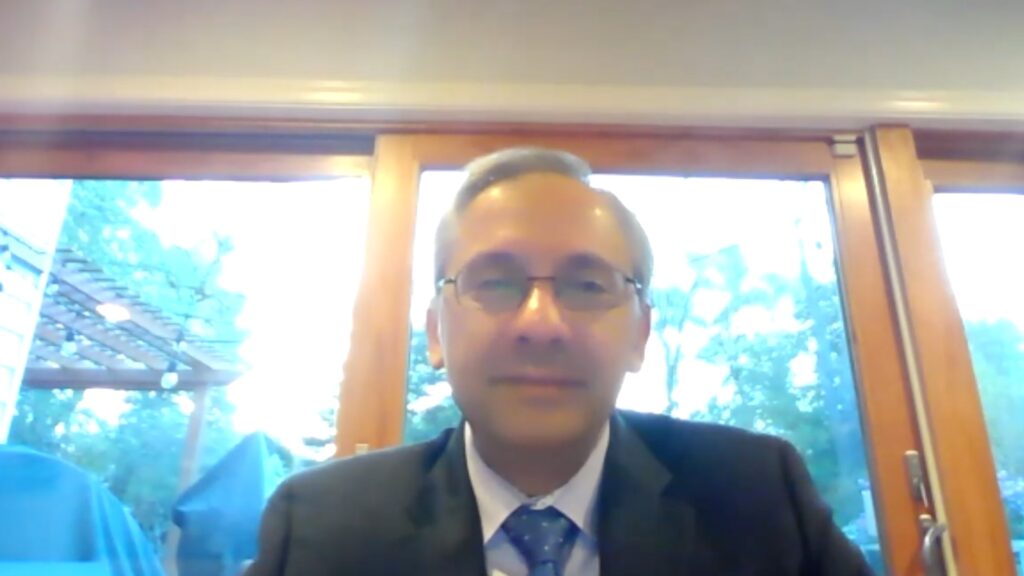Over the past two decades, gemcitabine has been the first-choice adjuvant therapy for advanced pancreatic cancer.1 Recent trial findings have evolved first-line standard of care; longer survival times and higher response rates have been achieved with combination treatments, compared with gemcitabine alone.1–3 The MPACT trial demonstrated survival benefits with nab-paclitaxol plus gemcitabine over gemcitabine alone in metastatic pancreatic cancer.2 In the PRODIGE study, a modified regimen of leucovorin, fluorouracil, irinotecan and oxaliplatin (FOLFIRINOX) led to significantly longer survival compared with gemcitabine adjuvant monotherapy among patients with resected pancreatic cancer.3
Pancreatic cancer remains a difficult-to-treat cancer, with a poor prognosis that has not improved meaningfully over time. The majority of patients are ineligible for surgical resection at the point of diagnosis, and typically survive for around 6 months.4 Among the 20% of patients that are eligible for surgery, survival is increased by around 10 months; additionally, the likelihood of disease recurrence, post-resection, Is high.4 The recent ESPAC-4 study found an increase in median overall survival from 25.5 months with adjuvant gemcitabine alone to 28.0 months with a combination of gemcitabine and capecitabine.5
The APACT study investigated the efficacy of adjuvant combination nab-paclitaxol/gemcitabine versus gemcitabine monotherapy in 866 patients with surgically resected pancreatic cancer. Trial results have been released and presented at the recent American Society of Clinical Oncology (ASCO) 2019 conference and the European Society for Medical Oncology’s 21st World Congress on Gastrointestinal Cancer (ESMO-GI).6,7
Participants had a median age of 64 years and a surgically resected pancreatic cancer, with no evidence of metastasis or persistent disease. Patients were randomised to therapies that were initiated within 12 weeks of resection: either nab-paclitaxel 125 mg/m2 plus gemcitabine 1,000 mg/m2 or gemcitabine 1,000 mg/m2 monotherapy. Treatment was administered over 6 cycles, each lasting 28 days.7
The APACT trial had an unusual mechanism for its primary endpoint, measuring disease-free survival (DFS) as assessed by independent radiologists who were unaware of the treatment context. The study investigators noted that this was a novel approach in trials of this nature; however, they hoped to provide an independent assessment that would be more robust compared with traditional investigator-led assessments.
The independent assessment of DFS found a non-significant improvement with nab-paclitaxel plus gemcitabine compared with gemcitabine alone of a median 19.4 months versus 18.8 months (hazard ratio [HR], 0.88; 95% confidence interval [CI], 0.729–1.063; p=0.1824), respectively.7 Patients with lymph node-positive disease and R1 resection were noted as benefiting most from combination treatment.
Prespecified investigator-led assessment of DFS reported a more meaningful benefit with nab-paclitaxel plus gemcitabine compared with gemcitabine alone: median 16.6 months versus 13.7 months (HR 0.82; 95% CI, 0.694–0.965; nominal p=0.0168).7
Because the independent radiologists were unaware of patients’ pre-operative state, the investigators suggested that reasons for the difference between independent assessment and investigator-led findings could include: challenges in differentiating post-operative changes from signals of recurrence; individual changes in carbohydrate antigen (CA) 19-9 levels; and interpretation of patient-reported findings.
At the time of this interim analysis, overall survival was 40.5 months with nab-paclitaxel plus gemcitabine compared with 36.2 months with gemcitabine (HR, 0.82; 95% CI, 0.680–0.996; nominal p=0.045); data are approximately 68% mature.7
Quality of life as assessed by the European Organisation for Research and Treatment of Cancer quality of life questionnaire (EORTC QLQ-C30) was initially slightly lower with nab-paclitaxel plus gemcitabine (score: 69.97) than with gemcitabine alone (72.59) though weeks 0–48; however, scores were similar between treatment arms through Week 180 and investigators noted a trend for improvement as the trial progressed.
Treatment-related adverse events of Common Terminology Criteria (CTC) grade ≥3 were reported in 86% of patients in the nab-paclitaxel plus gemcitabine cohort and 68% of patients receiving gemcitabine alone; neutropenia and fatigue were the most common haematologic and non-haematologic events, respectively.7
The investigators consider that the improvement in DFS suggests a role for nab-paclitaxel plus gemcitabine therapy in patients with resected pancreatic cancer who cannot tolerate FOLFIRINOX. Patients with lymph-node positive disease may also stand to benefit from nab-paclitaxel plus gemcitabine. 7 A clearer picture will develop as the overall survival data mature and are published in due course.
References
- Saung MT, Zheng L. Current standards of chemotherapy for pancreatic cancer. Clin Ther. 2017;39:2125–
- von Hoff DD, Ervin T, Arena FP, et al. Increased survival in pancreatic cancer with nab-paclitaxel plus gemcitabine. N Engl J Med. 2013;369:1691–
- Conroy T, Desseigne F, Ychou M, et al. FOLFIRINOX versus gemcitabine for metastatic pancreatic cancer. N Engl J Med. 2011;364:1817–1825.
- Oberstein PE, Olive KP. Pancreatic cancer: why is it so hard to treat? Therap Adv Gastroenterol. 2013;6: 321–337.
- Neoptolemos JP, Palmer DH, Ghaneh P, et al. Comparison of adjuvant gemcitabine and capecitabine with gemcitabine monotherapy in patients with resected pancreatic cancer (ESPAC-4): a multicentre, open-label, randomised, phase 3 trial. Lancet. 2017;389:1011–
- Tempero MA, Reni M, Riess H, et al. APACT: phase III, multicenter, international, open-label, randomized trial of adjuvant nab-paclitaxel plus gemcitabine (nab-P/G) vs gemcitabine (G) for surgically resected pancreatic adenocarcinoma. J Clin Oncol. 2019; Suppl 37: Abstract 4000.
- Reni M, Riess H, O’Reilly E, et al. An international, randomized, open-label, phase III trial of adjuvant nab-paclitaxel plus gemcitabine vs gemcitabine alone for surgically resected pancreatic adenocarcinoma (APACT): primary analysis and quality of life outcomes. Presented at: ESMO 21st World Congress on Gastrointestinal Cancer, Barcelona, Spain, 3–6 July 2019. Abstract P-001.






